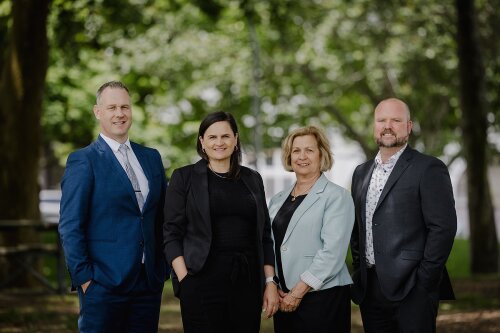Best Nursing Home Abuse Lawyers in Cambridge
Share your needs with us, get contacted by law firms.
Free. Takes 2 min.
List of the best lawyers in Cambridge, New Zealand
1. About Nursing Home Abuse Law in Cambridge, New Zealand
Nursing home abuse in Cambridge, New Zealand, is governed by nationwide laws and oversight frameworks designed to protect residents of aged care facilities. Abuse can include physical harm, neglect, emotional abuse, and violations of residents’ rights. Residents and their families in Cambridge can raise concerns through official channels such as the Health and Disability Commissioner (HDC) and, if needed, pursue civil remedies with a local solicitor.
In practice, families in Cambridge often navigate a two track approach: use formal complaints to address right abuses and, if necessary, pursue civil or criminal avenues. The local context in Cambridge intersects with provincial health services and funding programs managed by the national Ministry of Health, but residents still rely on NZ-wide standards for care quality and patient rights.
Understanding the formal rights, reporting pathways, and potential legal remedies helps Cambridge residents protect vulnerable relatives and seek appropriate accountability from care providers. A qualified solicitor can tailor advice to the specifics of a Cambridge rest home or hospital setting while aligning with national laws.
2. Why You May Need a Lawyer
Here are concrete, real-world scenarios in Cambridge where seeking nursing home abuse legal help is important. Each example reflects issues that commonly arise in aged care facilities across the Waikato region.
- A relative in a Cambridge rest home suffers repeated falls due to staff neglect and poor supervision, resulting in injury and medical costs. A solicitor can help document harm, preserve evidence, and assess civil liability against the provider.
- Meal times are irregular, leading to malnutrition or dehydration in a Cambridge facility. Families may need legal guidance on reporting neglect and pursuing compensation or regulatory remedies.
- Staff use inappropriate restraints or chemical sedation without consent, causing distress or harm to a resident in Cambridge. A lawyer can advise on stopping the practice and pursuing remedies under the Code of Rights.
- A resident’s private medical details are shared without consent by Cambridge staff, violating privacy protections. Legal counsel can outline privacy breach options and potential claims.
- A family suspects prolonged neglect after a decline in health, and the care provider refuses to adjust a care plan or acknowledge fault. A solicitor can help with strategic decisions about complaints, mediation, or litigation.
- Communication failures and misrepresentation about the level of care funded or available for a Cambridge resident lead to unexpected bills. A lawyer can evaluate contract terms and funding disputes for visibility and recourse.
3. Local Laws Overview
Cambridge residents are protected by national laws that apply uniformly across New Zealand. Key statutes and regulatory concepts influence how abuse is reported, investigated, and remedied in aged care facilities.
- Health and Disability Commissioner Act 1994 - Establishes the Health and Disability Commissioner and the framework for addressing complaints about health and disability services, including aged care. This act underpins formal rights-based processes used in Cambridge.
- Health and Safety at Work Act 2015 - Sets obligations for employers in the health and care sector to maintain a safe workplace and safe care environments. This Act affects how Cambridge facilities prevent abuse and respond to safety concerns.
- Code of Health and Disability Services Consumers' Rights (Rights Code) - A regulatory code guiding residents' rights, including the right to be treated with respect and receive appropriate care. It sits alongside the HDC framework and is used by Cambridge providers to assess treatment standards.
For residents and families in Cambridge, these laws translate into practical protections such as the right to complain, the obligation of providers to respond, and the availability of investigations and remedies. You can learn more about these frameworks through official sources from the Health and Disability Commissioner and the Ministry of Health. Health and Disability Commissioner and Ministry of Health provide detailed guidance on rights and complaint processes.
Right 1 - The right to be treated with respect; Right 2 - The right to freedom from discrimination; Right 3 - The right to dignity and independence; Right 4 - The right to proper and competent care and services.Source: Code of Health and Disability Services Consumers' Rights
4. Frequently Asked Questions
What is the Code of Health and Disability Services Consumers' Rights?
The Code sets residents' rights when using health and disability services in New Zealand, including aged care in Cambridge. It covers informed consent, respect, and quality of care.
How do I start a complaint about care in Cambridge?
Begin by contacting the Health and Disability Commissioner to discuss options. Gather records, dates, and any witnesses, then decide if you want to pursue a formal complaint or legal action.
How much can a nursing home abuse claim cost in Cambridge?
Costs vary with complexity. A solicitor may charge by the hour or offer a fixed-fee arrangement for initial consultations. You may also access some free or low-cost options through legal aid programs.
How long does an HDC investigation take in Cambridge?
Investigations typically run over several weeks to months depending on the complexity. Early resolution or mediation may shorten the timeline in some cases.
Do I need a solicitor to file an HDC complaint?
Not necessarily, but a solicitor can help you prepare a strong submission, organize evidence, and represent you in related civil matters if needed.
What is the process for reporting abuse to HDC?
You file a formal complaint with the HDC, provide supporting documents, and allow the HDC to review and respond. The HDC may investigate and require the provider to address the concerns.
Can I sue a facility for damages in Cambridge?
Yes, residents or families can pursue civil action for damages arising from abuse or neglect, often alongside or after a complaint to HDC. A solicitor can guide you through negotiations or court proceedings.
What is the difference between a complaint and a civil lawsuit?
A complaint to HDC seeks remedy for rights violations and improvements within the provider; a civil lawsuit seeks monetary damages and broader legal remedies through the courts.
Do I need to access resident records for my case?
Access to medical and care records is often essential. A solicitor can help you request records from the facility and verify what information can be shared under privacy laws.
Is there a time limit to file a complaint in Cambridge?
Time limits apply to some complaints, but the precise window depends on the nature of the issue and the channels used. Check with HDC and your solicitor for current timelines.
What qualifications should I look for in a nursing home abuse lawyer?
Look for a solicitor with experience in elder law, care complaints, and civil litigation. Ask about track records, client communication, and fee structures before engaging.
What is the difference between a solicitor and a barrister in New Zealand?
A solicitor provides general legal services and client communication; a barrister represents clients in court. Many Cambridge cases use solicitors who brief barristers for trials.
5. Additional Resources
These official resources provide practical guidance and formal processes for nursing home care concerns in Cambridge and throughout New Zealand.
- Health and Disability Commissioner - Handles complaints about health and disability services, including aged care. Function: investigate complaints and advocate for residents' rights. https://www.hdc.org.nz/
- Ministry of Health - Oversees policy, funding, and standards for aged residential care and disability support services. Function: sets national care standards and guidance for providers. https://www.health.govt.nz/
- Office of the Privacy Commissioner - Protects personal information and handles privacy complaints in care settings. Function: oversees privacy rights and data protection for residents. https://privacy.org.nz/
6. Next Steps
- Document the situation in detail. Create a timeline of incidents, collect photos, medical notes, and witness statements. Do this within 7 days where possible.
- Identify potential remedies. Decide whether to file a formal HDC complaint or pursue civil action with a solicitor. Consider mediation first if appropriate.
- Contact a Cambridge-based solicitor with elder care experience for an initial consultation. Aim to complete this within 2-4 weeks of the incident.
- Request relevant records. Ask the care facility for medical, care plans, and incident reports. Coordinate with your solicitor to ensure lawful access under privacy rules.
- Choose your course of action. If pursuing civil remedies, your solicitor will outline strategy, potential damages, and likely timelines.
- Submit formal complaints as advised. If engaging HDC, provide all evidence and listen to their guidance on next steps.
- Prepare for resolution or court proceedings. Civil actions can take 6-18 months depending on complexity and court scheduling. Your solicitor will provide a tailored timeline.
Lawzana helps you find the best lawyers and law firms in Cambridge through a curated and pre-screened list of qualified legal professionals. Our platform offers rankings and detailed profiles of attorneys and law firms, allowing you to compare based on practice areas, including Nursing Home Abuse, experience, and client feedback.
Each profile includes a description of the firm's areas of practice, client reviews, team members and partners, year of establishment, spoken languages, office locations, contact information, social media presence, and any published articles or resources. Most firms on our platform speak English and are experienced in both local and international legal matters.
Get a quote from top-rated law firms in Cambridge, New Zealand — quickly, securely, and without unnecessary hassle.
Disclaimer:
The information provided on this page is for general informational purposes only and does not constitute legal advice. While we strive to ensure the accuracy and relevance of the content, legal information may change over time, and interpretations of the law can vary. You should always consult with a qualified legal professional for advice specific to your situation.
We disclaim all liability for actions taken or not taken based on the content of this page. If you believe any information is incorrect or outdated, please contact us, and we will review and update it where appropriate.










